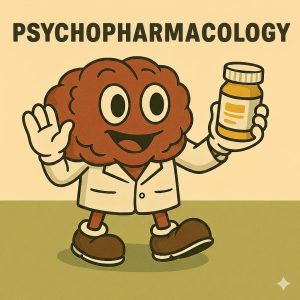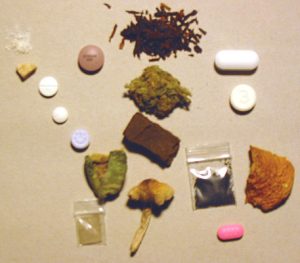Module 06: Psychopharmacology

Description: This module examines how psychoactive drugs affect neural function & behavior by acting on neurotransmitter systems. Students will explore drug mechanisms at synapses, basic principles of drug effects including tolerance, withdrawal, & addiction, & analyze major drug categories including stimulants, opiates, hallucinogens, & depressants.

Why This Module is Important: Understanding psychopharmacology is critical for counseling, clinical practice, & substance abuse treatment, enabling practitioners to understand medications, recognize substance abuse, & collaborate with medical professionals.
For counselors, this module provides:
- Understanding of how psychotropic medications work at the synaptic level for informed client discussions.
- Knowledge of addiction, tolerance, & withdrawal mechanisms essential for substance abuse counseling.
- Insight into how administration routes affect drug effects & the dangers of drug misuse.
- Understanding of contextual factors in tolerance & addiction for relapse prevention strategies.
For other psychology professionals, this module supports:
- Research into neurochemical mechanisms of addiction & pharmacological interventions.
- Clinical decision-making regarding medication referrals & side effect recognition.
- Educational approaches to substance use prevention through biological mechanisms.
- Public health perspectives on drug policy & harm reduction strategies.
Module Learning Objectives: By the end of this module students will be able to…
- MLO1: Identify mechanisms by which drugs act at synapses & classify specific drugs as agonists or antagonists for neurotransmitter systems. (CLO1, ULO1)
- MLO2: Analyze basic principles governing drug effects including routes of administration, tolerance, withdrawal, & addiction using classical conditioning & opponent-process theory. (CLO2, CLO3, ULO1)
- MLO3: Evaluate the effects of major psychoactive drug categories, assess their mechanisms of action, & critically examine treatment implications for substance use disorders. (CLO2, CLO4, ULO1)
Test Yourself: If you truly “know” this material then you will be able to…
- Describe how drugs act as agonists or antagonists at synaptic transmission points (synthesis, storage, release, receptor binding, reuptake, degradation), provide specific drug examples (tryptophan, reserpine, botulinum toxin, curare, SSRIs, organophosphates), & explain their effects on neurotransmitter activity. (MLO1)
- Explain how administration routes affect drug effects, analyze tolerance through enzymatic changes, synaptic adaptations, & classical conditioning, apply opponent-process theory to withdrawal symptoms, describe the nucleus accumbens role in addiction, & evaluate dangers of non-standard drug administration. (MLO2)
- Compare major drug categories (stimulants as adenosine or dopamine agonists, opiates as endorphin receptor agonists, hallucinogens acting on cannabinoid or serotonin receptors, depressants as GABA agonists), & discuss evidence-based addiction treatments including methadone maintenance & harm reduction strategies. (MLO3)
Media Attributions
- Psychopharmacology Buddy © Microsoft Copilot adapted by Jay C. Brown is licensed under a CC0 (Creative Commons Zero) license
- The Death of Marat © Jacques-Louis David is licensed under a Public Domain license
- Psychoactive Drugs © Thoric is licensed under a CC BY (Attribution) license
